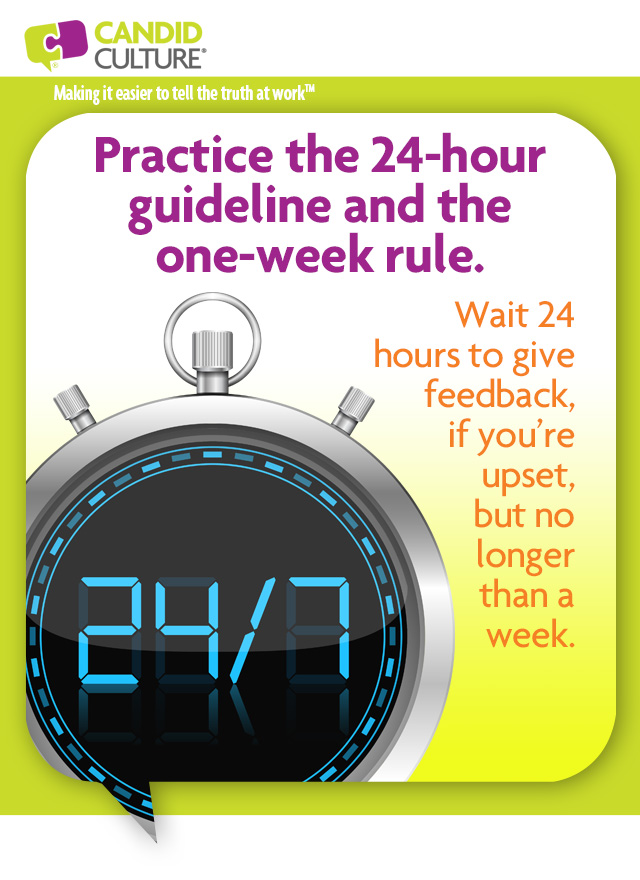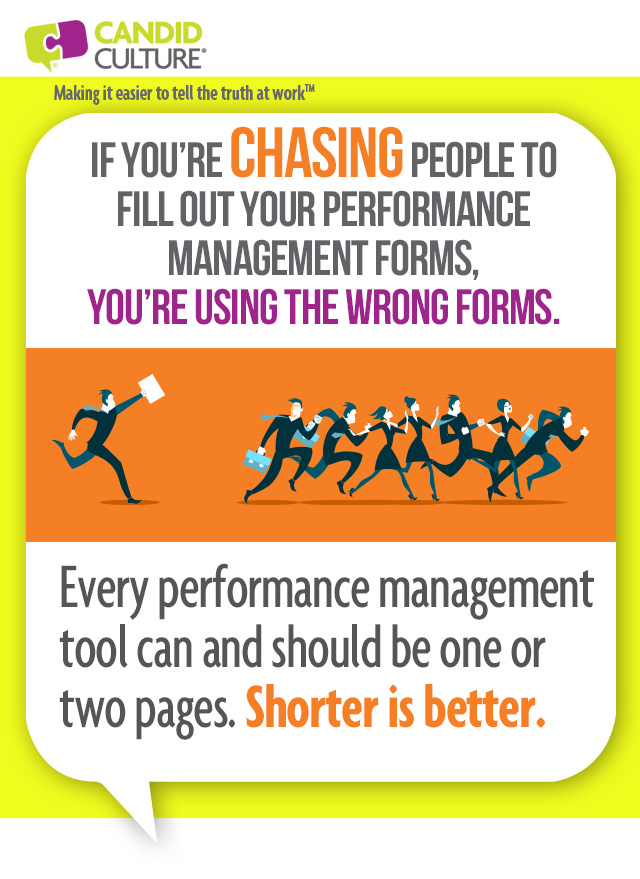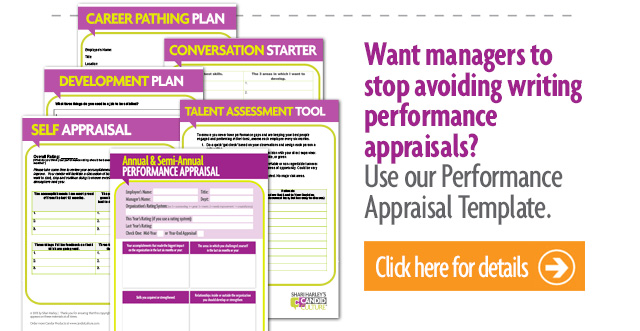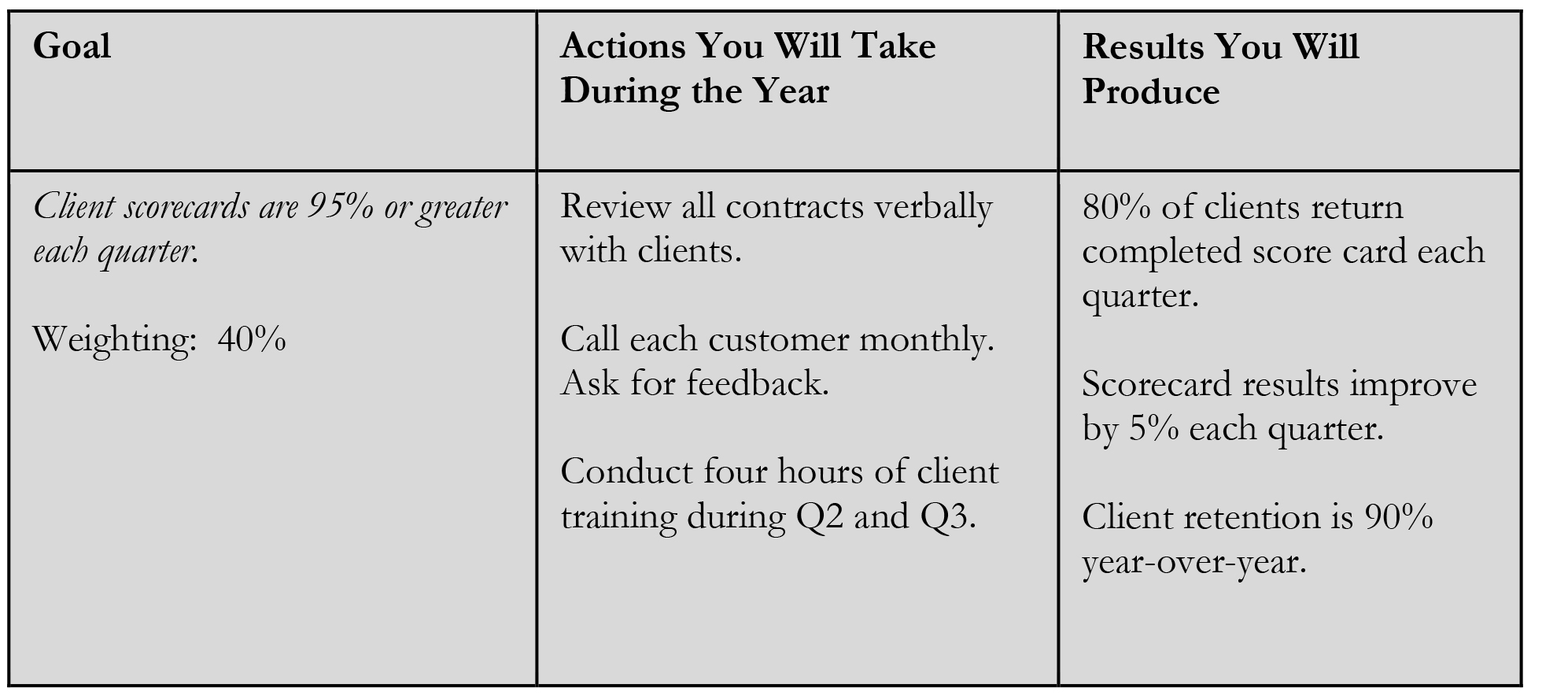Posts Tagged ‘performance appraisals’
Most of us wait to give negative feedback until it’s the right time, aka the recipient won’t get upset. Or we wait, hoping the situation will resolve itself. If something is really an issue, the likelihood of either happening is pretty slim. The right time to give feedback is shortly after something happens. I’ll offer up the 24-guideline and the one-week rule. Wait 24-hours to give feedback, if you’re upset. But don’t wait longer than a week.
The purpose of giving positive or negative feedback (I like the words upgrade feedback) is to motivate someone to replicate or change a behavior. That’s it. Feedback is supposed to be helpful. If you wait longer than a week to give either positive or upgrade feedback, the person isn’t likely to remember the situation you’re referencing and the purpose of giving feedback – to change or replicate a behavior – will be lost.
Here are four practices to make negative (upgrade) feedback conversations shorter, less painful, and more useful:
Giving feedback practice one: Agree to give and receive feedback at the onset of relationships. Do this with everyone you work with – direct supervisors, direct reports, peers, internal and external customers, and vendors. If we’ve done How to Say Anything to Anyone training for your organization or you’ve read the book, you got the specific language to have this conversation.
Giving feedback practice two: Prepare for feedback conversations by writing down what you plan to say and then delivering the feedback to a neutral person. Ask that person to tell you what she heard and what her expectations would be, based on what you said. Confide in someone either at your level or above at work or someone outside of work, to keep the gossip to a minimum. Ask for confidentiality.
Giving feedback practice three: Tell a neutral person about your situation, and ask what she would say to address the situation. Everyone but you will do a better job at giving feedback. Feedback conversations become hard when we’re emotionally involved. The guy working at the 7-11 will do a better job than you. Seriously. It’s our emotions and concern about the other person’s reaction that makes feedback conversations challenging.
Giving feedback practice four: Agree to do a weekly debrief with the people you work closely with, and follow through. Answer the questions – what went well this week from a work perspective and what would we do differently if we could. Answer the same questions about your working relationship. Giving feedback about your relationship will be hard at first. It will be easier the more you do it. Be sure to say “thank you” for the feedback, regardless of what you really want to say. One of the reasons giving negative feedback is so hard, is we wait too long. Shorter, more frequent conversations are better than long, infrequent discussions.
Giving negative feedback doesn’t have to be so hard. Follow the suggestions above and remind yourself that the purpose of giving feedback is to be helpful. If you were doing the wrong work, you’d want to know. And others do too.

 A professional athlete would never get on the court, field, or ice without knowing the rules of the game. Athletes know every action that will result in points, penalties, and other positive and negative consequences. Yet many of us go to work without any idea of how we’re being held accountable and what a good job looks like.
A professional athlete would never get on the court, field, or ice without knowing the rules of the game. Athletes know every action that will result in points, penalties, and other positive and negative consequences. Yet many of us go to work without any idea of how we’re being held accountable and what a good job looks like.
In the next few weeks, way too many people will have a performance review during which they will receive feedback that’s a surprise.
Writing clear, specific, and measurable goals is the key to managing your own work performance and to not being caught off guard by performance appraisals. Writing goals may not be sexy or fun, but doing so is the key to taking control of your year.
Four tips for setting goals at work:
1. Setting goals at work: Don’t wait for your manager to suggest writing goals. Ask permission to draft 5 to 7 goals.
2. Setting goals at work: Discuss and finalize each goal with your manager, and ask that the goals be the criteria for your 2017 evaluation.
3. Setting goals at work: Write such specific goals, that at the end of the year, it’s very clear whether you did or didn’t produce the agreed-upon results. When goals are specific, performance appraisals write themselves.
4. Setting goals at work: As business priorities and objectives change, goals change as well. Review your goals with your manager quarterly and make changes as appropriate.
Here are questions to answer when writing goals:
- What results will you produce? What will be different in the organization at the end of the year? (X%) Assign each goal a percentage. Weight each goal by importance.
- What actions will you take? What will you do, and when will you do it?
- How will you know you’ve made progress or achieved your goal? What will be different as a result of your work? (This should be quantitative. Use numbers.)
Here is a completed sample goal:
Results to produce: Retain 90% of new customers. Weighting: 40%
Actions to take:
- Have a setting-expectation meeting with each new customer.
- Return all customer calls within 24-hours.
- Call 10% of customers quarterly, and ask for feedback.
Milestones and year-end results:
- Customer complaints will drop by 20%.
- Customer change orders will drop by 10%.
When what you need to do during the year is clearly articulated, you’ve set yourself up to win. You know exactly what you need to do to be successful. Early in my career, I worked for an organization that did goal setting well. Each employee wrote 5 to 7 goals that were weighted and extraordinarily specific. It was obvious, throughout the year, if employees were meeting performance standards. And at the end of the year, it was so clear whether or not employees had done what they needed to do, employees could write their own performance appraisal. That’s the power of goals. Well–written goals drive performance, empower employees, and remove the debate about results.
Not every goal or objective at work is numerical and clear cut, but many are. Write down what you need to do and what the desired outcome looks like, whenever possible, and you’ll feel more empowered and in control at work than you previously thought possible.

No one (I know) enjoys writing, delivering or receiving performance feedback. It’s time consuming to write, challenging to deliver, and can be difficult to hear. Unfortunately, most performance management systems – goal setting forms, performance appraisal templates and online templates – don’t make the process easier. Ins tead, they make it harder. Short and simple is best.
tead, they make it harder. Short and simple is best.
When I started managing leadership development for a large company, I inherited a 12-page performance appraisal form and what seemed like 89 competencies. One of the business leaders I supported told me, “I’m not asking my people to use this form. If you can give me something that’s one page, I’ll have my managers use it.” That conversation sent me on a mission to make all performance management forms one or two pages. And really, why shouldn’t they be? People can only focus on leveraging and changing a few things at a time. Why give more feedback than that at any given time?
If you’re chasing people to use your performance management tools and templates, you have the wrong forms. In my experience, when people find something easy to use and valuable, they’ll use it. If something is difficult to use or doesn’t seem to add value, people drag their heels.
Here are a few ideas for making your performance management process easier:
Make your forms and templates simple. No performance management tool should be more than two pages. In a performance appraisal – quarterly, annual, or otherwise – identify up to three things the person did well and a max of three things s/he can either do more, better, or differently next year. Anything more is overwhelming and a set up for disappointment, frustration, and overwhelm.
If you have additional areas for the person to work on, meet again in 90-days and assess how the person has done with the three pieces of feedback already provided. If s/he has made significant progress on the things they were already working on, add a few new things to work on. If significant progress hasn’t been made on the existing feedback, wait to add more.
I know your existing performance management templates may not allow for what I’m suggesting. If you’re working with a template that requires more input, write up to three clear, succinct, and actionable bullets in each required area and not more. Bullets are better than paragraphs. Be specific. “Great job” is not feedback. Neither is, “needs improvement.” Give a specific example or two. No example, no feedback.
Resist the urge to write paragraphs of vague feedback or to accept that type of feedback in a self-appraisal. Paragraphs of feedback take too long to write and often say little. I’d suggest spending less time writing performance feedback and instead spend the time observing performance, asking others for input on the person’s performance, and writing three succinct, specific bullets that describe an action taken or outcome produced. Specific feedback is meaningful, useful, and received with less defensiveness.
Click below to see our suite of one and two-page performance management templates. And watch for our upcoming webinar on how to write and deliver performance appraisals that are less painful, more useful, and quicker to write and deliver.

Most people wait way too long to give feedback. We wait for the right time, aka when we’re comfortable. That day will not come.
Instead of waiting to give feedback until you’re about to explode in frustration, or until a formal review, give feedback every time you meet with someone.
Managers, make it a practice to meet with each of your employees at least once a month. Twice a month or weekly would be better. But if you’re not doing one-on-one meetings now, start meeting monthly. If you’re meeting monthly, start meeting twice a month. Employees need face time with their boss. Team meetings and casual conversations do not replace individual meetings.
Direct Report One-on-One Meeting Agenda:
The direct report comes to the meeting ready to discuss:
1. What she’s working on that is going well.
2. What she’s working on that is not going well.
3. What she needs help with.
4. Then the manager gives feedback on what went well since the last meeting and what could be improved.
5. And the employee gives the manager feedback on what has gone well since the last meeting and what could be improved.
Feedback goes both directions. Managers, if you want your employees to be open to your feedback, ask for feedback from your employees on what they need from you. Give feedback on both the work and your working relationship. A poor working relationship often motivates employees to leave a job, but it’s the last thing that gets discussed.
Feedback discussions should be short. You can say anything in two minutes or fewer. No one wants to be told she isn’t cutting it for 20 minutes. Say what you need to say and end the conversation or move on to another topic.
If you’re not giving your employees regular feedback, you can use this language to start:
“I’m realizing that I’m not giving you enough feedback. I want to be helpful to you. If I don’t provide regular, timely feedback, I’m not being as helpful as I could be. I’d like to start a regular practice of meeting monthly, getting an update from you on how things are going, and giving each other feedback on what went well and what could be improved since our last meeting.”
 If you work for someone who is not forthcoming with feedback, ask for feedback. You’re 100% accountable for your career. Don’t wait for your manager, customers or peers to give you feedback. Ask for feedback on a regular basis.
If you work for someone who is not forthcoming with feedback, ask for feedback. You’re 100% accountable for your career. Don’t wait for your manager, customers or peers to give you feedback. Ask for feedback on a regular basis.
Here’s how you can ask for feedback from your manager:
“Your feedback helps ensure I’m focused on the right work. Can we put a monthly meeting on the calendar, and I’ll tell you what I’m working on, where I do and don’t need help, and we can discuss how things are going?”
If meetings get cancelled, reschedule them. If your manager says these meetings aren’t necessary or she doesn’t have time, tell her, “Your regular input is helpful to me. What’s the best way to ensure we catch each other for a few minutes each month?” Meaning, push the issue.
If your manager still doesn’t make time for the meetings or doesn’t provide clear and specific feedback, even when you ask for examples, ask your internal and external customers and coworkers for feedback. The people you work closely with see you work and will likely give feedback, if asked.
No news is not necessarily good news. Waiting six months or a year to receive performance feedback is like going on a road trip from St. Louis to Los Angeles but not consulting a map until you arrive in New York, frustrated and far from your desired destination.
Managers: Meet with employees monthly, semi-monthly or weekly, and give feedback every time you meet.
Employees: Ask your managers, customers, and coworkers for regular feedback, and take control of your career.

A professional athlete would never get on the court, field, or ice without knowing the rules of the game. Athletes know every action that will result in points, penalties, and other positive and negative consequences. Yet many of us go to work without any idea of how we’re being held accountable and what a good job looks like.
In the next few weeks, way too many people will have a performance review during which they will receive feedback that’s a surprise.
Writing clear, specific, and measurable goals is the key to managing your own work performance and to not being caught off guard by performance appraisals. Writing goals may not be sexy or fun, but doing so is the key to taking control of your year.
Four tips for setting goals at work:
1. Setting goals at work: Don’t wait for your manager to suggest writing goals. Ask permission to draft 5 to 7 goals.
2. Setting goals at work: Discuss and finalize each goal with your manager, and ask that the goals be the criteria for your 2015 evaluation.
3. Setting goals at work: Write such specific goals, that at the end of the year, it’s very clear whether you did or didn’t produce the agreed-upon results. When goals are specific, performance appraisals write themselves.
4. Setting goals at work: As business priorities and objectives change, goals change as well. Review your goals with your manager quarterly and make changes as appropriate.
Here are questions to answer when writing goals:
- What results will you produce? What will be different in the organization at the end of the year? (X%) Assign each goal a percentage. Weight each goal by importance.
- What actions will you take? What will you do, and when will you do it?
- How will you know you’ve made progress or achieved your goal? What will be different as a result of your work? (This should be quantitative. Use numbers.)
Here is a completed sample goal:
Results to produce: Retain 90% of new customers. Weighting: 40%
Actions to take:
- Have a setting-expectation meeting with each new customer.
- Return all customer calls within 24-hours.
- Call 10% of customers quarterly, and ask for feedback.
Milestones and year-end results:
- Customer complaints will drop by 20%.
- Customer change orders will drop by 10%.
Early in my career, I worked for an organization that did goal setting well. Each employee wrote 5 to 7 goals that were weighted and extraordinarily specific. It was obvious, throughout the year, if employees were meeting performance standards. And at the end of the year, it was so clear whether or not employees had done what they needed to do, employees could write their own performance appraisal. That’s the power of goals. Well–written goals drive performance, empower employees, and remove the debate about results.
When what you need to do during the year is clearly articulated, you’ve set yourself up to win. You know exactly what you need to do to be successful.
Not every goal or objective at work is numerical and clear cut, but many are. Write down what you need to do and what the desired outcome looks like, whenever possible, and you’ll feel more empowered and in control at work than you previously thought possible.

 Many year-end performance reviews include whatever the manager and direct report can remember happening during the last six to twelve weeks of the year. For the most part, managers and direct reports sit in front of blank performance appraisals and self-appraisal forms and try to remember everything that happened during the year. The result: A vague, incomplete performance review that leaves employees feeling disappointed, if not discounted.
Many year-end performance reviews include whatever the manager and direct report can remember happening during the last six to twelve weeks of the year. For the most part, managers and direct reports sit in front of blank performance appraisals and self-appraisal forms and try to remember everything that happened during the year. The result: A vague, incomplete performance review that leaves employees feeling disappointed, if not discounted.
If you were disappointed by your performance review this year, don’t let it happen again next year. Take charge of your career by writing your own goals.
One of the first companies I worked for did the goal process so well, I learned early in my career how powerful well written goals could be. Each employee set five to seven goals. Experienced employees wrote their own goals and then discussed those goals with their manager. Less experienced employees wrote their goals with their manager. Managers wrote goals for inexperienced employees. The goals were so specific and clear that there could be no debate at the end of the year whether or not the goal had been achieved. It was obvious. Either employees had done what they said they would, or they hadn’t. This made writing performance appraisals very easy. Very little on the appraisal was subjective. And this gave employees a feeling of control over their year and performance.
It’s great if you work for an organization or manager who works with you to write goals. If you don’t, write your own goals and present them to your manager for discussion and approval. Managers will be impressed you took the initiative to write goals and will be thankful for the work it takes off of them.
Goals should be simple and clear. It must be obvious whether you achieved the goal or not. There should be little if any room for debate.
Sample goals are below.
Desired Outcome (goal):
• Improve client feedback – too vague
• Get better written reviews from clients – better
• 80% of clients respond to surveys and respond with an average rating of 4.5 or above – best
Actions you will take to achieve the goal:
• Ask clients for feedback throughout project — too vague
• Ask clients for feedback weekly – better
• Visit client site weekly. Talk with site manager. Ask for feedback — best
Goal template:

Completed sample goal:

How to approach your manager with written goals:
Try using this language with your manager: “I want to be sure I’m working on the things that are most important to you and the organization. I’ve written some goals for 2014 to ensure I’m focused on the right things. Can we review the goals, and I’ll edit them based on your input? And what do you think of using the agreed-upon goals to measure my performance in 2014?
You have nothing to lose by writing goals and presenting them to your manager. You will gain respect from your manager, clarity of your 2014 priorities, and more control of your year-end performance review. Give it a try, and let me know how it goes.
If you want more feedback from your manager, ask these questions.

If I hear this one more time I might lose it.
Manager: “One of my employees has been making a lot of mistakes. He seems disengaged. I’m not sure what’s happening.”
Me: “Have you talked to him?”
Manager: “No. Performance appraisals are coming up, so I’ll just wait to give the feedback until then.”
Me: “When are performance appraisals?”
Manager: “In six weeks.”
Most people hoard feedback. We wait for the right time, aka when we’re comfortable. That time will never come. The right time to give feedback is when something happens or shortly thereafter. Practice the 24-hour rule and the one-week guideline. Give feedback when you’re not upset, but soon after the event occurs, so people remember what you’re talking about.
Most employees feel as if they’re treated unfairly during some portion of a performance appraisal. Employees receive feedback they’ve not previously heard, or receive feedback that is unbalanced – overly positive or negative, or the feedback is so vague employees aren’t sure what to do more, better or differently.
Good performance appraisals are a quick summary of all the performance conversations you’ve had during the year and planning for next year. To have an appraisal meeting like this one, managers need to meet with their employees regularly and give feedback every time you meet. And that is the management BEST suggestion I can make.
Meet regularly with your employees. If you never meet one-on-one with employees, start meeting monthly. If you meet monthly, meet twice a month. If you meet twice a month, consider meeting weekly for 30 minutes.
The one-on-one meeting agenda, which the employee owns:
- What is the employee working on that’s going well?
- What is the employee working on that is not going great, but she doesn’t want your help?
- What is the employee working on this isn’t going great and she wants your help?
- Give each other feedback: What went well since you last met? What could be improved?
** Give and receive feedback on the work and on your relationship. This will be hard the first few times you do it, but will become easier with each successive conversation.
Ask your employee to create a meeting agenda. Take notes on the agenda and keep your notes. The summary of these meetings becomes your annual performance appraisal.
Regardless of whether or not you’re meeting regularly, throughout the year and have performance notes, you can only give small pieces of feedback during the appraisal meeting. Discuss three SPECIFIC things the employee did well during the year and three things she should do next year. People can’t focus on more.
Think about the New Year’s resolutions you may have made last January. You might have promised yourself you’d save ten percent of your income, lose twenty pounds, take a two-week vacation without your phone, and apply to attend graduate school. How many of those things did you do? Setting too many aggressive goals sets us up to fail. And performance appraisals are not different.
Consider how each of your employees must impact your department and your organization’s annual goals. In that context, determine the most important things each employee did to contribute to those goals this past year and what she should have done more, better or differently? That’s your appraisal. Not more and not less.
During performance appraisals, force yourself to focus on and present ONLY the most important behaviors and outcomes, and your employees will bring the same focus to the ensuing year.

 Most people wait way too long to give feedback. We wait for the right time, aka when we’re comfortable. That day will not come.
Most people wait way too long to give feedback. We wait for the right time, aka when we’re comfortable. That day will not come.
Instead of waiting to give feedback until you’re about to explode in frustration, or until a formal review, give feedback every time you meet with someone.
Managers, make it a practice to meet with each of your employees at least once a month. Twice a month or weekly would be better. But if you’re not doing one-on-one meetings now, start meeting monthly. If you’re meeting monthly, start meeting twice a month. Employees need face time with their boss. Team meetings and casual conversations do not replace individual meetings.
Direct Report One-on-One Meeting Agenda:
The direct report comes to the meeting ready to discuss:
1. What she’s working on that is going well.
2. What she’s working on that is not going well.
3. What she needs help with.
4. Then the manager gives feedback on what went well since the last meeting and what could be improved.
5. And the employee gives the manager feedback on what has gone well since the last meeting and what could be improved.
Feedback goes both directions. Managers, if you want your employees to be open to your feedback, ask for feedback from your employees on what they need from you. Give feedback on both the work and your working relationship. A poor working relationship often motivates employees to leave a job, but it’s the last thing that gets discussed.
Feedback discussions should be short. You can say anything in two minutes or fewer. No one wants to be told she isn’t cutting it for 20 minutes. Say what you need to say and end the conversation or move on to another topic.
If you’re not giving your employees regular feedback you can use this language to start:
“I’m realizing that I’m not giving you enough feedback. I want to be helpful to you. If I don’t provide regular, timely feedback, I’m not being as helpful as I could be. I’d like to start a regular practice of meeting monthly, getting an update from you on how things are going, and giving each other feedback on what went well and what could be improved since our last meeting.”
 If you work for someone who is not forthcoming with feedback, ask for feedback. You’re 100% accountable for your career. Don’t wait for your manager, customers or peers to give you feedback. Ask for feedback on a regular basis.
If you work for someone who is not forthcoming with feedback, ask for feedback. You’re 100% accountable for your career. Don’t wait for your manager, customers or peers to give you feedback. Ask for feedback on a regular basis.
Here’s how you can ask for feedback from your manager:
“Your feedback helps ensure I’m focused on the right work. Can we put a monthly meeting on the calendar, and I’ll tell you what I’m working on, where I do and don’t need help, and we can discuss how things are going?”
If meetings get cancelled, reschedule them. If your manager says these meetings aren’t necessary or she doesn’t have time, tell her, “Your regular input is helpful to me. What’s the best way to ensure we catch each other for a few minutes each month?” Meaning, push the issue.
If your manager still doesn’t make time for the meetings or doesn’t provide clear and specific feedback, even when you ask for examples, ask your internal and external customers and coworkers for feedback. The people you work closely with see you work and will likely give feedback, if asked.
No news is not necessarily good news. Waiting six months or a year to receive performance feedback is like going on a road trip from St. Louis to Los Angeles but not consulting a map until you arrive in New York, frustrated and far from your desired destination.
Managers: Meet with employees monthly, semi-monthly or weekly, and give feedback every time you meet.
Employees: Ask your managers, customers, and coworkers for regular feedback, and take control of your career.

Most managers write performance appraisals from a blank page. They sit at their desks trying to remember all the good things employees did throughout the year. But it’s hard to remember a whole year’s worth of events. So the appraisal ends up being a review of the last quarter, which is all they can remember.
Don’t let this happen to you.
The time to start preparing for your performance appraisal is now. Not in January, now.
Two months ago I wrote a blog encouraging you to ask your boss’s permission to give him/her a list of your 2012 accomplishments. Just in case you didn’t do it, I’m reminding you again.
Most of us are not great at self promotion. We think that if we do great work, the right people will notice, and we’ll get the recognition – status, money, responsibility – we deserve. In fact, many people critique others who are good at self promotion thinking that they’re suck ups, who make themselves look good at others’ expense. And we don’t want to be like that. So we decide, “I’ll quietly do my job well and eventually I’ll get the recognition I deserve.”
You can promote yourself and the work you do without appearing arrogant, self inflated, or trampling on others.
Think about it this way, no one knows the work you do better than you do. Your boss doesn’t follow you around. S/he doesn’t know all the great stuff you do every day. It’s your job to tell her.
Here’s how to promote yourself:
Create a one-page sheet of your projects and accomplishments. Bring this sheet to your one-one-one meetings with your boss, however frequently they occur. At the end of the year these sheets become the cheat sheet from which to write your review. Aggregate all the information you’ve captured during the year and ask your boss’s permission to provide it to help him/her write your appraisal. S/he won’t say no. Writing appraisals is time consuming. If you can make the process easier, it strengthens your relationship with your boss and makes you look good. But you must ask for permission to send the list.
If you haven’t been assembling a list of accomplishments, create one for 2012 now. And start creating a list in January of 2013, and add to the list regularly.
It’s your job to promote yourself and tell the people you work with what you’re doing. Simply say:
“Here’s what I’ve been focused on…”
“Here are a few projects my team finished…”
“Here’s something I’m working on…”
“I’m really proud of…”
Any of these phrases will do the trick. Don’t make your boss guess. Make it easy to promote you.
I received lots of emails last week about performance appraisals gone wrong. Some made me sad. Some made me sigh. And the ‘best of’ the worst was so outlandish it made me laugh out loud. Really laugh out loud. Not that LOL thing we overuse.
The ‘best of’ the worst examples of performance appraisals are below.
Bad example #1: Giving mixed messages.
• Giving an employee working on a long project gift cards as a reward and then during the performance appraisal telling her she did the whole project wrong and had to start over.
Bad example #2: Waiting too long to give feedback.
• Giving an employee a performance appraisal six months late.
Bad example #3: Being lazy.
• Using the employee’s self appraisal as the final appraisal, without the manager adding any of his or her own comments.
Bad example #4: Never awarding the highest rating possible, to anyone.
• If a one is the best rating and a five is the worst rating, no one ever earns a one.
Bad example #5: Holding people to expectations and standards but not sharing those expectations.
• Not clarifying at the beginning of the year what the expectations are and what a good job looks like.
Bad example #6: Never giving employees feedback about their performance.
• Writing performance appraisals and documenting performance issues, but giving none of the written or verbal feedback to the employee.
Bad example #7: Giving small amounts of vague feedback.
• Giving little to no data in the review because the manager didn’t work closely enough with the employee to observe performance directly and didn’t ask others in the organization to provide feedback.
Bad example #8 (I received this example SEVERAL times): Providing only a written appraisal.
• Handing an employee a written appraisal while in a meeting with other people and never having a conversation.
This is just hilarious:
“During my annual performance appraisal I was asked if I was manic. After a moment or two of trying to understand what my supervisor meant by the comment, I finally asked. My supervisor replied, “Well, you are so upbeat about your job all the time, I just thought you were manic. Nobody can be that happy about working here.””
The winner for being the ‘best of’ the worst:
My manager tossed my performance appraisal on my desk saying, “Just look this over and sign it. I want it back by the end of the day.” Of course, the appraisal was full of feedback and expectations that I had never received.
I told my manager, “There is a lot of information here that was never discussed with me. I would have liked the opportunity to discuss these issues before it showed up in my review.”
The manager replied, “See this is why I didn’t want to meet with you! I knew you would react badly! Just man up, take the feedback, and sign the thing! It’s due to HR today.”
You can’t make this stuff up.
Managers: If you do a little better than these ten examples of performance appraisals, you’re outperforming your manager peers. Sad but true.
Employees: You are responsible for your career happiness, success, and satisfaction, not your boss. Ask for expectations at the beginning of anything new and for regular feedback.
Take your performance into your own hands:
1. Don’t wait for your boss to set expectations. Ask your boss for his/her expectations. Get very clear on what a good job looks like, before you start working on a project and/or when the year starts.
2. Write annual goals and review them with your direct supervisor at least quarterly. During your regular one-on-ones, ask for feedback. If you don’t have regular one-on-ones, start. Ask your boss’s permission to schedule a one-on-one at least quarterly to update him/her on projects and to gather feedback.
3. Ask for regular feedback on pieces of work as you complete the work. Don’t wait until the end of a project to get feedback.
4. Ask for feedback about your overall performance once a quarter.
Ask these questions:
• How am I doing so far this year performance wise?
• What mistakes have I made from which I need to recover?
• What aspects of my work have contributed most to the organization?
• What do I need to do between now and the end of the year to ensure a positive performance appraisal?
The performance appraisal system doesn’t have to be rife with challenge and lead to disappointment. Take more control over your conversations and thus your outcomes.




 A professional athlete would never get on the court, field, or ice without knowing the rules of the game. Athletes know every action that will result in points, penalties, and other positive and negative consequences. Yet many of us go to work without any idea of how we’re being held accountable and what a good job looks like.
A professional athlete would never get on the court, field, or ice without knowing the rules of the game. Athletes know every action that will result in points, penalties, and other positive and negative consequences. Yet many of us go to work without any idea of how we’re being held accountable and what a good job looks like.
 tead, they make it harder. Short and simple is best.
tead, they make it harder. Short and simple is best.



 Many
Many 




 Most people wait way too long to give feedback. We wait for the right time, aka when we’re comfortable. That day will not come.
Most people wait way too long to give feedback. We wait for the right time, aka when we’re comfortable. That day will not come.
